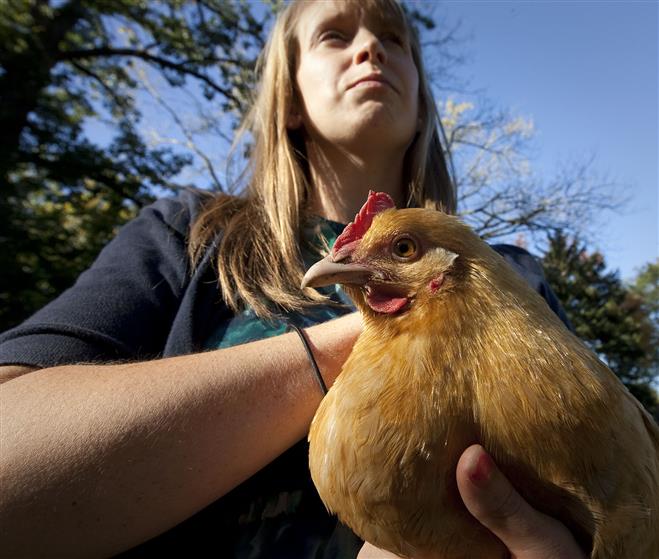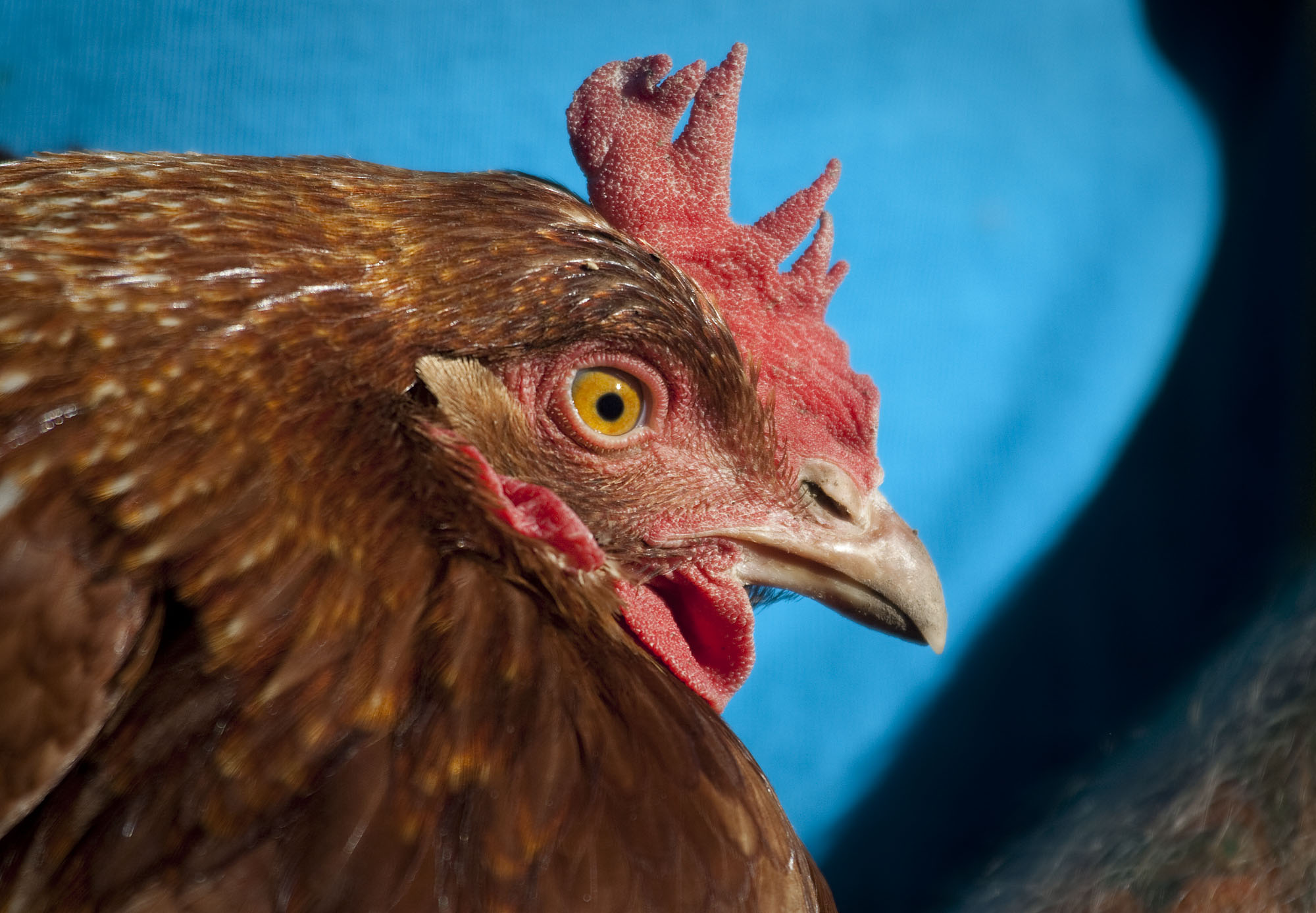Wauwatosa chicken keepers see fowl as part of a healthy lifestyle
Hold a chicken wrong and it explodes in your hands. Feathers are everywhere. The wings flap furiously, making a swooshing, popping sound. Failing to hold the wings down is a mistake a novice would make, but Eric and Lisa Fowler have perfected it.
Theirs is one of the four households holding chicken licenses from the city of Wauwatosa. They have four birds — Delores, Patricia, Laverne and Ione — who live in a large coop, with indoor and outdoor areas, a second floor where the hens sleep, and an adjacent, fenced area of the backyard lawn where they can roam a little farther.
Wherever they are, the birds are constantly pecking. As Eric Fowler said, "Their whole job is to eat."
Eric works at a metal fabrication company, and Lisa works at the Wisconsin Humane Society in Milwaukee. They bought their chickens as young birds for $5 a piece in May from a couple of area farms. For them, Wauwatosa's venture into legalizing chicken coops is working very well, allowing them to expand their goal of eating naturally produced foods.
Eggs for breakfast
They chose their hens partly for their hardiness in cold weather; in fact, Lisa Fowler said, "They do better in the cold than in the heat."
The chickens are of varied breeds. One is a Buff Orpington, another is an Ameraucana, a third is a Redstar hybrid, and the fourth they call a mutt. One of the chickens, younger than the rest, has yet to lay an egg, but is a variety that generally produces blue eggs. The other three produce about one egg each per day.
"We eat eggs and bacon for breakfast five days a week," Eric said.
The eggs are a big part of why the couple got chickens.
"We're very concerned with where our food comes from," Eric said.
They grow as much food for themselves as they can. The garden on their half-acre lot contains tomatoes, peppers, brussels sprouts, lettuce, cabbage, broccoli, squash, pumpkins, herbs, raspberries, blackberries, strawberries and asparagus — "a little bit of everything," Lisa said, though noted that it'd been a tough summer for gardens. The Fowlers also have two pear trees, a peach tree and a couple of apple trees.
They can and freeze some of what they produce, shop at Outpost and farmers markets in Wauwatosa and Butler, and are careful about eating out, choosing restaurants that promote naturally raised animals and locally purchased ingredients. Comet Cafe, Braise and Chipotle are some examples. Even AJ Bombers offers a hamburger made with organic, grass-fed beef.
A lifestyle choice
"It's definitely a lifestyle choice," Eric said. "All our friends go to the bar, and we go to the farmers market. ... It's a lot of work. It's very rewarding, though, and we know that we're not having a negative impact on the environment by buying factory-farmed meat or buying produce that's been trucked 2,500 miles to get here."
The chickens are docile, even affectionate in their way, Lisa said, and come to her when she approaches them, although, as she said, she generally brings them food. They are fed a mix of grains, lentils and other things — better, more expensive food than many of their farmed peers.
"We get everything from either Outpost or Pick 'n Save. We prefer to feed them everything organic, because we're eating the eggs," Eric said.
The habits of chickens
The chickens bathe in dirt — many don't like water, and if it's cold, a soaked chicken can get sick — and they like light, filing up a ramp and into the upper portion of the coop when the sun goes down. If their coop was lighted, they would lay more eggs more quickly, but might have shorter egg-laying careers, Lisa said.
The chickens sleep lined up on a high perch, holding on with their talons all night. The coop is bedded with wood chips, and the chickens choose to lay their eggs in a small, dark, low-ceilinged, protected area, where the Fowlers have installed a hinge that allows them to pull the eggs out.
Eric said their neighbors have had no complaints about the birds, and, in fact, two elderly neighbors come over almost every day to sit outside the coop and watch them. Those same neighbors came to a city committee meeting with the Fowlers to speak in support of the chickens.
A chicken may lay eggs for about five years, and live to be 10 or more.
What will happen when the chickens stop laying?
"We'll be eating less eggs," Eric said.
Will they be eating chickens?
"We haven't gotten that far yet. We'll see what happens," Lisa said.
More from News and Features
- Anodyne Coffee plans to open location in Wauwatosa Village
- Wauwatosa Meetings: Aug. 4
- Video: Wauwatosa girl's curbside ice cream stand raises money for the hungry
- Wauwatosa News and Notes: Hands-only CPR training offered; Firefly Art Fair is Aug. 6-7
- Wauwatosa Ask Now: Why are there barriers and fencing along the North Avenue bridges over the Menomonee River?
- Mystery Photo Contest: July 28
- Wauwatosa gears up for National Night Out event, this year at the zoo
- Election 2016: Wisconsin's 4th District candidates weigh in
- Wauwatosa's Luther Manor residents share smiles through flower delivery
- Wauwatosa Police Report: July 17-23
















